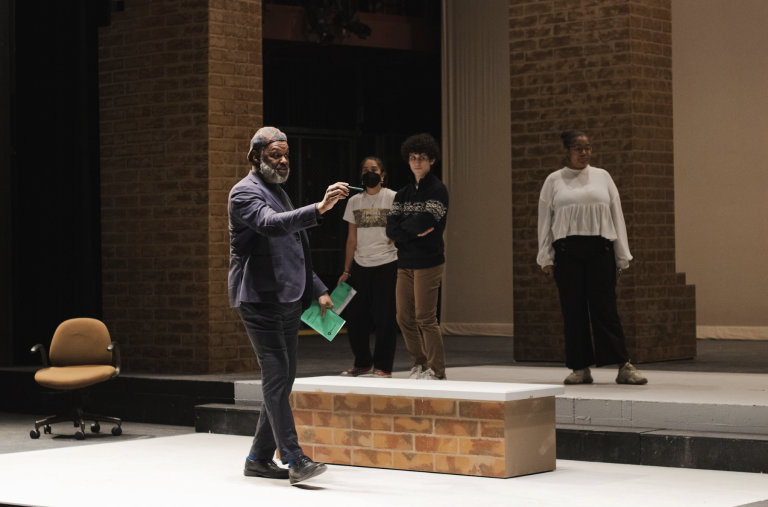TRIP SLAYMAKER ’18
A&E EDITOR
The best novels defy categorization. It is difficult to completely grasp George Saunders’ Booker Prize winning novel Lincoln in the Bardo because it contains ideas and experimental ways of writing that have never been placed together before. Saunders tricks his readers into believing in a perfectly realized world by placing his experimentally written, conceptually blinding story into a fascinating, empathetically recreated moment in real-world history.
The “Lincoln” of the title is not the sixteenth president himself, but his young son Willie, who died in 1862 during the hopeful early days of the Civil War. His death came suddenly and was a major milestone in the life of his father Abraham, and devastated the twelve-year-old’s mother Mary Todd Lincoln. The child’s death was, in the novel and in reality, a public tragedy made still worse by the revelation that the Lincolns had failed to cancel a costly and ostentatious party for the Washington elite while Willie struggled through his final hours upstairs. The bulk of Saunder’s brilliant idea must have grown from his knowledge of an incident following the boy’s funeral. President Lincoln was said to have appeared alone at Washington D.C.’s Oak Hill Cemetery to cry over his son’s body not once, but several nights following his son’s death from typhoid fever.
Saunders’ prose consists of the spoken accounts of ghosts dwelling in the Oak Hill Cemetery. These are the collected voices of scores of dead people, all of whom spend their hours obsessing over the beautiful minutiae or painful drudgery of their long-lost lives. Saunders’ ghosts do not realize that they are dead: they avoid the truth for the pain and fear it would cause them, and because they are unsure of what would happen to them if they were to be judged. Theirs is a hopeless, repetitive, eternal existence, trapped in a purgatory like the “bardo” of Tibetan Buddhism. They are wafting shades that disappear with the first light of morning. The graveyard characters are both rich and poor, courteous and crass, black and white: they are perfectly rendered individuals, who seem plucked out of history, with all its beauty and awfulness. These are not romantic, wailing spirits of the eighteenth century, but the neurotic, complex ghosts of a modernity made sharply aware of death by the coming of great bloodshed.
The hopeless and forgotten ghosts of the cemetery are invigorated by the appearance of Abraham Lincoln in the dead of night, who holds his son’s head in his very hands as though he could shake him awake again. Poor Willie Lincoln himself only becomes more convinced that he has good reason to stay and wait around in hopes of a return to the world of the living. The other spirits follow suit and gain confidence in their endeavor to stay at all costs, especially after learning that the visiting gentleman is President of the United States.
During Lincoln’s visits the ghosts are able to pass through the memories and enter the perspective of the president. His psyche is a disorganized series of moments. Lincoln exists one way with his family, another way in the oval office, another in the depths of mourning and despair, and in the throes of ambition. Through perfectly appropriate primary and secondary source material interspersed throughout, (about half of which is written by the author) Saunders provides an unusual view of the man and his role in ushering in the great slaughter of our nation’s history, the Civil War. These passages draw attention to the details of the national moment, and the president’s lousy public opinion at a time when the war had just begun to enter its bloodier phases.
It is through the act of ghostly emotional exchange that Willie Lincoln may once again be able to communicate with his father. Should he stay? Leave and be parted from a family he loves? Lincoln’s mind reveals to all spirits and readers the vivid strain of a son’s death, the pressure of a mounting death toll, and the dawning notion that soon he would be the one to bring identical pain to countless fathers everywhere. It’s an extremely intimate and observant psychological portrait that places the man in an impartial light, not only as a president but also as a young father truly coming to terms with death for the first time in his life.

goodreads.com
Lincoln in the Bardo is notable for a series of dazzling accomplishments. It completely subverts existing literature of ghosts and the afterlife to achieve a close and personal connection to history. The experience is sometimes even uncomfortably close to the subject. Saunders constructs a near perfect story of human unity in the presence of death from what some might consider a historical footnote about the death of the president’s son. Rarely have two once-living individuals been so thoroughly reinvigorated on the page as Abraham and Willie Lincoln in this spectacular, engrossing novel.
Tuesday, January 14 2025
The Student Newspaper at Trinity College in Hartford, Connecticut




+ There are no comments
Add yours